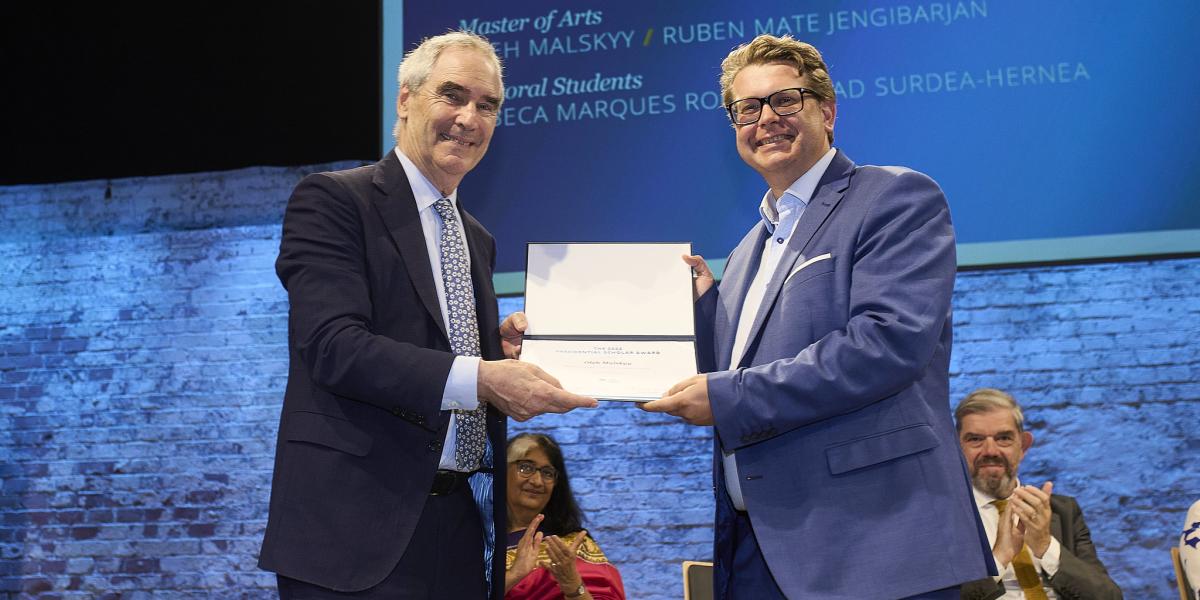Spotlight on Presidential Scholar Award Recipient Oleh Malskyy | European Union University

Oleh Malskyy, the recipient of a 2023-24 Presidential Scholarship, is completing his MBA in Global Executive Management and MA Economics and Business this year at EUU. His research and capstone project focus on the reconstruction of Ukraine.
EUU spoke with Malskyy, who is from Ukraine, to learn about his studies and his path to EUU.
What does this award mean to you?
It's great that when Michael Ignatieff received his Dan David prize, he decided to reshare some of it through this scholarship. It's a very nice gesture and I think this sharing and caring principle is very important. This is one of the best things about EUU - that it's a sharing community. Whenever I discussed ideas for my research proposal, everybody was very helpful from the professors at the MBA program to the students who are my peers. Gratitude was the emotion I felt from the award ceremony and the whole scholarship process.
What does your research address?
My parents are professors, so I really like academia, particularly when it is practical. The idea for my research on Ukraine is very personal to me. As a Ukrainian, there is much discussion about post-war reconstruction and the rebuilding of Ukraine. All the proposals so far seem to be limited to ideas about the amount of damage and how much it will take to rebuild roads, schools, cities, infrastructure and so forth. I think people are missing a bigger picture that includes considering what the economic role of Ukraine should be in the post-war environment. So, the potential economic role is what I am looking at through my research and capstone project.
Assuming we reconstruct the roads, the energy sector and essential infrastructure, I ask then, what does Ukraine produce and what is the European and global demand? What is the competitive advantage of Ukraine? Will Ukraine still be interesting as a logistical center? We previously had this concept that Ukraine is good for logistics and cargo, because there was always a trade between East and West. If trade between East and West declines through the new geopolitics, should we still concentrate on Ukraine being a logistical hub?
At this point for the reconstruction of Ukraine, I see a huge gap between the idea of re-establishing the necessities and having an economic plan. A plan that is thoughtful and considers the interests of various stakeholders and that has a vision for where we are heading. So, the question and the whole concept for my research proposal is, what do we have to build?
It is a bit difficult to predict the invisible hand, because generally the market should answer that question by locating demand. But I think we must plan ahead. Because if you don’t think about that, why should people go back? Can you create good conditions for a labor force to return? It all comes together through this broader planning.
How are you approaching these questions?
In addition to studying the cases of other post-war countries, I'm trying to get trade statistics to see how trade became different during COVID and during war, including aspects such as sanctions and substitution of products. By analyzing the trade flows, you get some idea of where demand is, and where the security concerns lie, especially since logistics has become more difficult. So, I’m approaching this by taking into account the trade flows and geopolitics.
What was your path to EUU?
It was a return path. The first time I heard about EUU and its programs with the ideas of ‘open society’ was back in 1996 or ‘97. I was doing undergraduate studies back home in Ukraine at the University of Lviv and we had a couple of visiting professors from EUU. I remembered the lectures and when there was a conference at EUU in Budapest for some of the best papers and presentations, I attended and loved that conference.
Later when I was thinking about professional development, I learned that EUU moved to Vienna, which was good and led to me taking this opportunity to study. I liked how the university in the 90s, right after independence, served as a very interesting, groundbreaking place with professors from the West. EUU was always special to me because of the people. Not standard, but outstanding in its own way.
What drives your work?
If you have an idea, and it is intellectually satisfying, it's important to give it attention. Once you believe something is important, you can continue coming back to it again and again. That is how I feel about my research and studies.
Business is important and you can't really ignore that part of community and pillar of world order. I think that you must consider the interaction between the social, political and business. That's the way to promote the ideas of an open society.
What advice do you have for other students applying for this scholarship?
You really must select a project that drives you, one that just keeps you burning. Once you find that passionate idea that you enjoy and that you think is important - even if it is maybe outside of the ordinary, futuristic, or a bit theoretical - you can really believe that it is necessary and something to stay with over a longer period. Then even if it becomes challenging, you have a plan to hit that long term goal, and nothing will stop you. So that's my advice, to find your passion and an idea that will never leave you until you're done achieving the result.
The Presidential Scholars Fund was established by Michael Ignatieff and Zsuzsanna Zsohar. It supports four Presidential Graduate Research Awards for exceptional master’s and Doctoral students whose research shows promise for the next generation. The Fund also awards two scholarships per year to incoming bachelor's students demonstrating exceptional academic credentials and leadership promise.
Last updated: February 23, 2024

